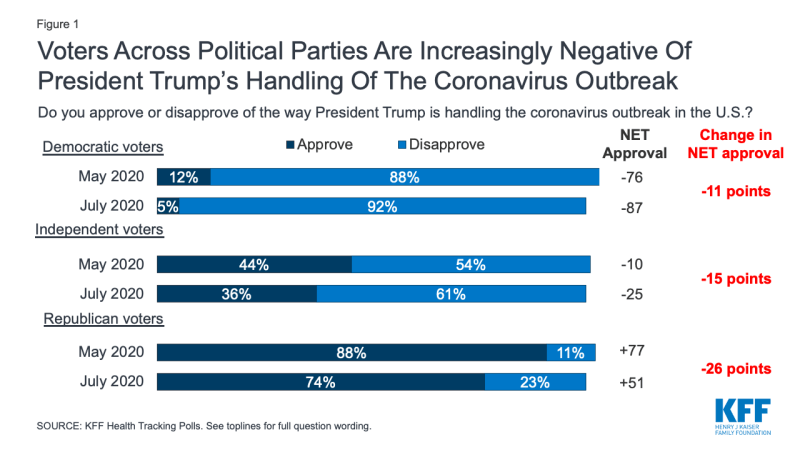Voters Are Souring on President Trump’s Handling of Coronavirus, with Implications for November
Ashley Kirzinger, Audrey Kearney, and Liz Hamel
Published:
As the country struggles to get a handle on the coronavirus pandemic and prepares for the 2020 election, this analysis finds that, while voters are increasingly negative in their evaluations of President Trump’s handling of the pandemic, he continues to garner strong support among Republican voters – even those living in areas disproportionately impacted by the virus.
The latest KFF Tracking Poll finds that 61% of voters disapprove of President Trump’s handling of the coronavirus and 35% approve, his worst marks since the virus hit the United States. This is consistent with other national polling tracked in the interactive chart below, which shows the president’s job approval on coronavirus on a downward trend since early summer, mirroring the trend in his overall job approval. In late July, polling from major news organizations found that twice as many voters disapprove of President Trump’s response as approve (ABC News/Ipsos). While this has dissipated slightly in early August, the overall trend, coupled with KFF’s June poll that found voters preferring Democratic nominee Joe Biden over Trump when it comes to handling the pandemic, led us to wonder if the coronavirus outbreak – and the U.S. response – is damaging President Trump’s reelection chances.
An analysis of KFF polling finds a measurable drop in the president’s coronavirus approval rating across voters, regardless of political party. Between May and July, President Trump’s net approval on handling of coronavirus (the share who approve minus the share who disapprove) dropped 11 percentage points among Democratic voters, 15 points among independent voters, and 26 points among Republican voters.

Figure 1: Voters Across Political Parties Are Increasingly Negative Of President Trump’s Handling Of The Coronavirus Outbreak
Despite the drop in net approval, voters’ opinions of President Trump’s response to the coronavirus remain largely partisan, and most Republican voters (74%) continue to approve of how the president is handling the pandemic.
We also sought to understand whether voters’ evaluations of the president’s handling of the virus differed among those living in states while they are seeing spikes in cases, “hotspot” states1 (several of which are also important Electoral College battleground states according to The Cook Political Report) and those living in other states. Our analysis finds that, while similar partisan differences exist, voters in current hotspot states – and Republican voters in particular – give the president more positive ratings for his handling of the pandemic than voters in states with lower numbers of new coronavirus cases. For example, in July, President Trump’s net approval rating on coronavirus among Republican voters was +58 percentage points in hotspot states and +44 in non-hotspot states. This suggests that the overall decline in the president’s ratings reflects a widespread erosion in job approval – and not something tied entirely to local circumstances.
| Table 1: Partisan Voters In COVID-19 Hotspots Views Of President Trump | ||||
| Do you approve or disapprove of the way President Trump is handling the coronavirus outbreak in the U.S.? | Registered Voters, Overall and by Party | |||
| Total | Republicans | Democrats | Independents | |
| Voters living in COVID-19 hotspot states | ||||
| Approve | 38% | 76% | 3% | 36% |
| Disapprove | 57% | 18% | 96% | 62% |
| Net approval (percentage points) | -19 | +58 | -93 | -26 |
| Voters living in non-hotspot states | ||||
| Approve | 34% | 72% | 7% | 37% |
| Disapprove | 63% | 28% | 90% | 61% |
| Net approval (percentage points) | -29 | +44 | -83 | -24 |
In addition, large majorities of Republican voters regardless of location approve of the job President Trump is doing in general, and most still plan on voting for him in November. Over eight in ten Republican voters (86% in COVID-19 hotspot states and 82% in non-hotspot states) now approve of Trump’s overall job as president, and a similar share (85% in both hotspots and non-hotspots) say they are either “definitely” or “probably” going to vote for President Trump in November.
It is clear that voters are increasingly negative in their views of how President Trump is handling the coronavirus, and with former Vice President Joe Biden garnering higher levels of trust on the issue, this could signal troubles for the president’s reelection chances if voters see the election as a referendum on his coronavirus performance. For now, though, President Trump still has strong support among his base of Republican voters, even among those living in states disproportionately impacted by COVID-19.
Endnotes
For the purpose of this analysis, we define hotspot areas as states in which there have been more than 150 cases per 100,000 people in the past seven days at the time the July poll was taken. The states included in this grouping are AR, CA, AZ, AL, LA, FL, GA, ID, MS, NV, SC, TN, TX, and OK.
